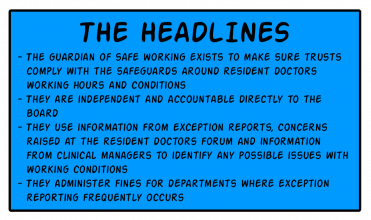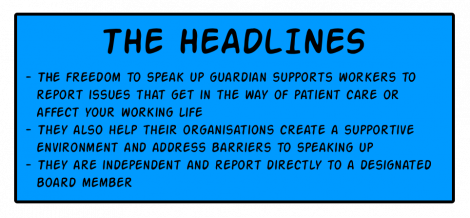If you have any issues or problems that cannot be dealt with in your meetings or by your education team, there are other people who can help you. This page gives you a brief outline of these people and their role.
Contents
The freedom to speak up guardian
Professional support (PSWS/PSU)
The guardian of safe working

What is the guardian of safe working’s role?
The guardian is responsible for making sure trusts comply with the safeguards around resident doctors working hours, as outlined in the 2016 contract terms and conditions. They should act as a champion of safe working for resident doctors.
What do they do?
The guardian is required to seek out the opinions of resident doctors on their working conditions regularly. This can be both through the resident doctors forum as well as more informal meetings. In addition to this they should liaise with the medical education team and with clinical and educational supervisors to identify any issues around working conditions they may have noted.
A large part of the guardians role is around exception reporting. Through reviewing exception reports from resident doctors they can;
- Escalate issues in relation to working hours to relevant mangers
- Identify any risk to doctors or patient safety and act upon this appropriately
- Intervene directly in any instance where safety is compromised
- Ask for a work schedule review to be undertaken if they have concerns over working hours in a post
Fines are levied against areas where exception reporting occurs or when exception reporting cannot be accessed. With assistance from the resident doctors forum, the guardian helps distribute this money to improve training and service experience of doctors.
Do all hospitals have a guardian of safe working?
Any hospital with ten or more resident doctors in training must have a guardian. Any hospital with less than ten must provide access to a guardian from another NHS organisation.
Who can be a guardian of safe working?
The role can be taken up by anyone who is “able to command the respect of both resident doctors and management.” There is no specific guidance on who can be the guardian, but the BMA recommends they are a qualified senior doctor. This could be a consultant, a SAS doctor, or an equivalent clinical academic.
Do they get time set aside for the role?
All guardians should have time set aside in their working week specifically for the role. The BMA recommend that a guardian should get one PA, around four hours per week.
Are they independent?
Yes. In order to ensure independence, the guardian is not managed by the clinical director. Instead they are accountable to the board. In order to ensure their independence is maintained, the guardian should not hold another senior management role. Ideally, they should not be an educational supervisor. If they are, then an alternative guardian will be needed for anyone they are supervising (a second guardian, or a reciprocal agreement with another trust.)
Do they work with all resident doctors?
The role was designed after the changes to resident doctors contract in 2016 to help with issues around working hours. Whilst the guardian is not responsible for locally employed, academic and armed forces doctors, BMA guidance stresses there is an expectation that the guardian should help all trainees where possible. This is because many issues are likely to be similar, regardless of which contract the trainee is on.
What should I do if my guardian of safe working is not championing our rights?
If you are experiencing any issues, you should discuss these with the medical education team.
The freedom to speak up guardian

What is the freedom to speak up guardian’s role?
Freedom to speak up guardians support workers to report issues outside of the usual routes available to them. As well as ensuring that any issues raised are responded to, they work proactively to support their organisation in tackling barriers to speaking up.
What do they do?
The national freedom to speak up guardian framework states that all guardians should meet five core principles in their role:
- Championing a supportive environment so all workers feel safe and supported when speaking up
- Proactively identifying and overcoming barriers that prevent workers from raising concerns
- Providing timely feedback and follow-up when issues are raised
- Using insights from concerns raised to drive organisational learning and improvement
- Ensuring robust governance and assurance to maintain transparency and accountability throughout their organisation
Do all hospitals have a freedom to speak up guardian?
Every NHS provider organisation and any organisation contracted by the NHS has to have at least one Freedom to Speak Up Guardian.
What issues can I report to the guardian?
You can speak up about anything that gets in the way of patient care or affects your working life. This could be a trust policy that isn’t being followed and is putting people at risk, episodes of discrimination, or times when the behaviours of others are affecting the wellbeing or you, a colleague or a patient.
As speaking up covers a range of issues, there are may be other pathways you can report these issues through. This could be via the resident doctors forum, a meeting with your supervisor or directly to HR. The guardian is there if these pathways have been ineffective, or you are not able to use them for your specific issue. If in doubt, speak up.
Can I report issues anonymously to the guardian?
If you contact the guardian, they can explain how the process of a disclosure works to ensure you are happy with the process. Whilst it is possible to report concerns anonymously, this may limit the guardian’s ability to investigate fully if they do not have all the information they need.
Do they work with all resident doctors?
The guardian of safe working can work with anyone employed by your trust. This includes both clinical and administrative staff.
Who can be a guardian?
The guardian should be someone with senior management experience. Whilst this role is sometimes fulfilled by a medical professional, they do not need to be a clinician.
Are they independent?
Your guardian works independently and report directly to a designated senior member of the board. National guidance strongly recommends that all guardians are appointed in a standalone role, supporting them to maintain independence and impartiality.
What should I do if my guardian does not provide the help I need?
If you are experiencing any issues, you should discuss these with the medical education team.
Professional support (PSWS/PSU)
Why does the Professional Support and Wellbeing Service (PSWS) exist?
For most doctors there are times in their career when additional support is needed. This can be for many different reasons; from personal, physical or mental health concerns, to family issues, career worries and workplace stress. There is support available to all doctors in training via their Supervisor, through their Specialty School and within their Trust. However, for some doctors it is helpful to have confidential support from outside these settings, particularly when training and progression is affected. This is where the PSWS can help.
What do PSWS offer?
The PSWS tailors its service to the individual, depending on their needs. We recognise that there is no “one size fits all” – we are all unique and medical training is complex.
Once we have received a referral, the individual is allocated to one of our experienced Case Managers, with the aim of supporting them to continue training with confidence. They may be referred to one of our specialist services which include enhanced exam support, personal coaching, advanced communications/language support, neurodivergence assessment and support, and careers coaching.
How can people access PSWS?
To access the service a suitable educator from the local education team needs to complete the KSS PSWS referral form. The educator is usually the individuals Educational Supervisor, but a Clinical Supervisor, College Tutor, Training Programme Director, Head of School or Director of Medical Education can also help.
If anyone in need of a referral feels they cannot discuss their needs or issues with any of the people outlined above, they should contact the PSWS directly at england.ksspsws.se@nhs.net for a confidential conversation.
Who can access the service in KSS?
The service is currently available to doctors in the KSS General Practice and Foundation training programmes. KSS Public Health doctors should access the Thames Valley PSWS. Doctors in other postgraduate specialist training programmes should contact the London PSU for support.